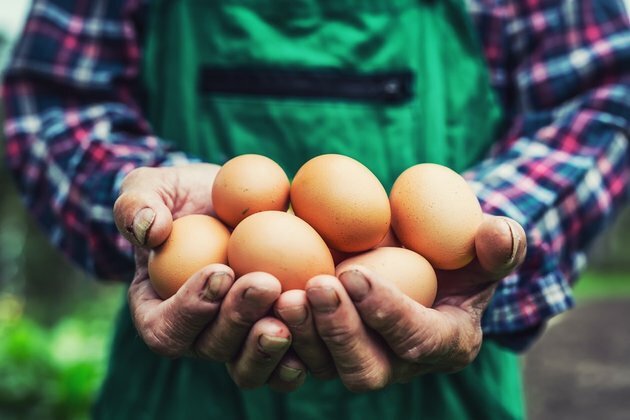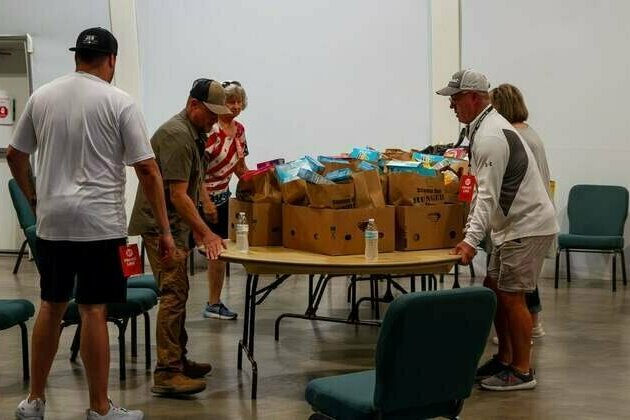Food shortages: five ways to fix 'unfair' supply chains
The Conversation
25 Jan 2023, 12:10 GMT+10

UK food prices soared by more than 16% in 2022 as record inflation pushed up the prices of everything from bread to beans.
Tesco chairman John Allan recently suggested that suppliers could be using this situation to boost prices. Speaking to the BBC's Laura Kuenssberg about whether food companies were taking advantage of consumers with recent price rises, Allan said: "I think that's entirely possible".
While he admitted he hadn't "seen their cost structures", he said the supermarket chain was fighting "very hard to challenge cost increases". Tesco has previously refused to stock certain products while haggling over prices with suppliers.
Allan's comments have been criticised by food firms and farmers alike. They argue that they are suffering from rising costs and often don't see the benefits of food price hikes.
For example, farmers and suppliers - many of whom are small- and medium-sized firms (SMEs) - have recently argued they are not getting a fair price for their eggs from supermarkets and other big-box stores. The price of a dozen eggs at the till rose by 45p over the course of 2022, but many farmers only saw 5p-10p of that rise, according to figures released in November by the British Free Range Egg Producers Association.
Combined with rapidly rising production costs and the impact of the worst avian flu pandemic in history, this is putting enormous strain on these producers and suppliers. And the current combination of rising interest rates and high input and energy costs is generating concern among farmers in general.
In this rising price environment, these businesses are at risk of further pressure on their cash flows or even future production failure. This could eventually impact the UK's food supply chain resilience and security, and also increase waste.
Indeed, producers and suppliers can face a significant power imbalance in food supply chains, which can feed through to higher prices for consumers. While such businesses often bear all the risks of producing and supplying items like eggs, many are unable to bargain for more favourable trading terms with powerful retailers.
Our previous research suggests small businesses in other industries also have little or no bargaining power in such situations. These businesses must adhere to the terms imposed by their buyers, or risk losing income.
Supporting supply chain fairness will not only safeguard these companies from collapse, it will also help relieve shortages for consumers and could prevent future food supply crises.
Fairness in supply chains
The concept of "fairness" is frequently overlooked in discussions about supply chain sustainability, perhaps because it is so subjective. When evaluating fairness in any exchange, one party compares their inputs and outputs, and what they believe they deserve.
These decisions usually come down to context, being shaped by the nature of the exchange and any previous interactions with the other party.
While the concept of fairness is rarely included in the sustainability agenda of an organisation, in a supply chain context the fundamentals of fairness can be measured using three key dimensions:
- the economic returns derived from the relationships;
- how decisions are governed, as well as the policies and procedures related to the relationships;
- the extent to which the other party communicates relevant information and resolves conflicts with openness.
Based on these measures, our recent research has produced five strategies that could help promote food supply chain fairness:
1. Revisiting the terms of trade
Given the relative weakness of suppliers, it is essential to re-evaluate their contract terms with supply chain partners and ensure that these terms allocate profits or benefits equally. In supply agreements, it is essential to provide clear and unambiguous terms of trade. These business terms require legal enforcement and repercussions.
2. Alignment across the food supply chain
The supply chain may be misaligned when it comes to the ethical values and practices of the various participants, allowing unfair practices to persist. One way to address this is to foster mutual understanding, standard practice and value among all stakeholders in the supply chain. This can be achieved through risk sharing, relationship building, and dedicated investments that benefit the entire chain.
3. Lobbying and advocacy
Suppliers as a whole need to send messages that will move relevant authorities and government agencies to take concrete steps toward implementing policy changes. Such bodies include the National Farmers' Union, the Food and Drink Federation and the Department for Environment, Food and Rural Affairs, as well as more general groups such as the Federation of Small Businesses and the Confederation of British Industry.
4. Addressing the power imbalance
It is crucial to bring back agricultural marketing boards - government entities that oversee agricultural production and compliance. These organisations could help put producers and distributors of agri-food commodities on an equal footing with retailers when it comes to bargaining. Government action, in the form of policy reviews and adjustments to the existing structures for procurement and supply chains, would also help. The concept of fairness should also be incorporated into the sourcing and supplier relationship practices of large retailers.
5. Education to raise standards
All supply chain members need ethical supply chain management education to raise industry standards. UK professional bodies like the Chartered Institute of Procurement and Supply and the Chartered Institute of Logistics and Transport could help regulators and supply chain members develop the right skills, knowledge and new perspectives.
Implementing these five strategies will require all supply chain members to take these necessary steps.
With rising demand for food and a growing global population, it is more important than ever to build a resilient food supply chain. Our research shows that preventing a food crisis in the UK means placing fairness at the heart of our food supply chains.
Authors: Adegboyega Oyedijo - Lecturer in Operations and Supply Chain Management, University of Leicester | Temidayo Akenroye - Associate Professor of Supply Chain & Analytics, University of Missouri-St. Louis 
 Share
Share
 Tweet
Tweet
 Share
Share
 Flip
Flip
 Email
Email
Watch latest videos
Subscribe and Follow
Get a daily dose of Sports Sun news through our daily email, its complimentary and keeps you fully up to date with world and business news as well.
News RELEASES
Publish news of your business, community or sports group, personnel appointments, major event and more by submitting a news release to Sports Sun.
More InformationUS Sports
SectionSurging Marlins storm back to beat Brewers
(Photo credit: Sam Navarro-Imagn Images) Rookie Agustin Ramirez grounded a two-out, two-strike, two-run, tie-breaking single in the...
Ryne Nelson retires 16 straight as Diamondbacks knock off Royals
(Photo credit: Rick Scuteri-Imagn Images) Ryne Nelson retired the first 16 batters he faced, Randal Grichuk homered and the host...
Strong pitching, three HRs carry Phillies past Reds
(Photo credit: Bill Streicher-Imagn Images) Edmundo Sosa, Alec Bohm and Kyle Schwarber homered as the Philadelphia Phillies topped...
Red Sox tally seven in third inning, rout Nationals
(Photo credit: Daniel Kucin Jr.-Imagn Images) Ceddanne Rafaela hit a two-run home run as part of a seven-run third inning that carried...
Blue Jays win second straight in extra innings vs. Angels
(Photo credit: John E. Sokolowski-Imagn Images) Addison Barger hit an RBI single with two outs in the 11th inning and the Toronto...
Report: Grizzlies agree to deal with C Jock Landale
(Photo credit: Troy Taormina-Imagn Images) The Memphis Grizzlies agreed to a deal with free agent center Jock Landale, per ESPN....
NFL
SectionElks search for their first win of the season against Redblacks
(Photo credit: Anne-Marie Sorvin-Imagn Images) Since COVID-19 canceled the 2020 CFL season, the Edmonton Elks have tried multiple...
After SEC visits, 4-star WR Xavier McDonald picks Sacramento State
(Photo credit: Kirby Lee-Imagn Images) Sacramento State head coach Brennan Marion reached into Southeastern Conference territory...
Houston Texans donate $500K to help flood victims
(Photo credit: Paul Witwer/Standard-Times / USA TODAY NETWORK via Imagn Images) The Houston Texans announced a $500,000 commitment...
WR Kaydon Finley shuns dad's alma mater, picks Notre Dame
(Photo credit: Ronald W. Erdrich/Reporter-News / USA TODAY NETWORK) Four-star wide receiver Kaydon Finley has committed to Notre...
Former NFL LB Bryan Braman battling rare cancer
(Photo credit: Geoff Burke-Imagn Images) Former NFL linebacker Bryan Braman is 'in the fight of his life,' battling a rare and aggressive...
Ailing Deion Sanders expected to return to work soon
(Photo credit: Isaiah J. Downing-Imagn Images) Colorado coach Deion Sanders, who has been suffering from an undisclosed medical condition,...













